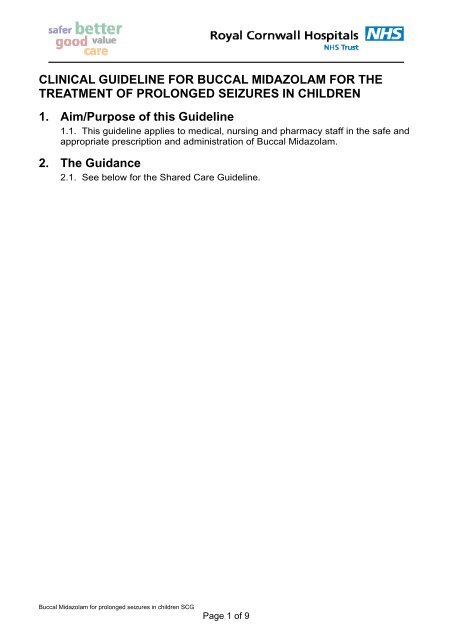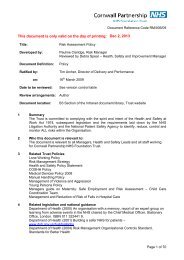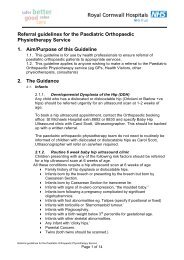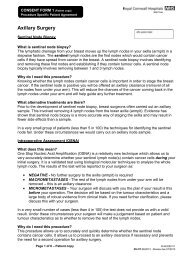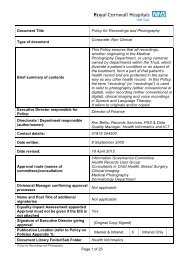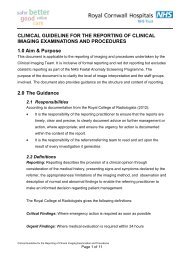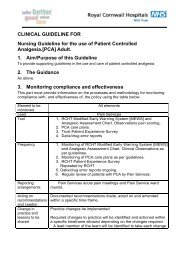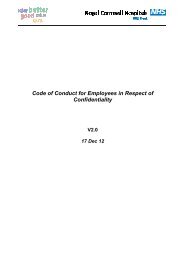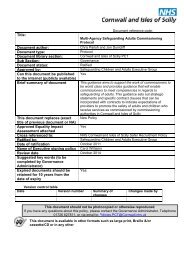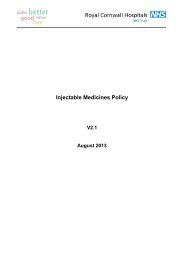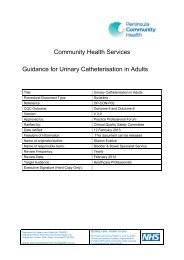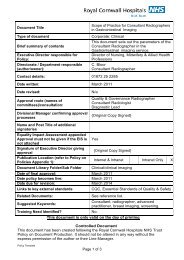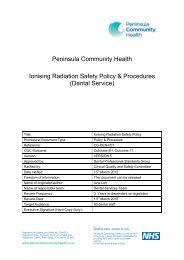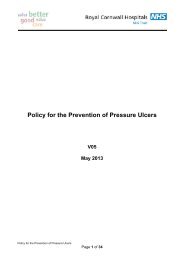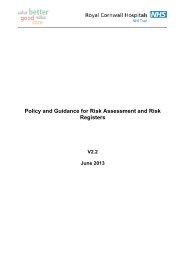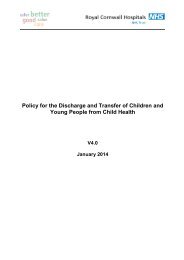Buccal Midazolam Shared Care Guideline - the Royal Cornwall ...
Buccal Midazolam Shared Care Guideline - the Royal Cornwall ...
Buccal Midazolam Shared Care Guideline - the Royal Cornwall ...
You also want an ePaper? Increase the reach of your titles
YUMPU automatically turns print PDFs into web optimized ePapers that Google loves.
CLINICAL GUIDELINE FOR BUCCAL MIDAZOLAM FOR THE<br />
TREATMENT OF PROLONGED SEIZURES IN CHILDREN<br />
1. Aim/Purpose of this <strong>Guideline</strong><br />
1.1. This guideline applies to medical, nursing and pharmacy staff in <strong>the</strong> safe and<br />
appropriate prescription and administration of <strong>Buccal</strong> <strong>Midazolam</strong>.<br />
2. The Guidance<br />
2.1. See below for <strong>the</strong> <strong>Shared</strong> <strong>Care</strong> <strong>Guideline</strong>.<br />
<strong>Buccal</strong> <strong>Midazolam</strong> for prolonged seizures in children SCG<br />
Page 1 of 9
BUCCAL MIDAZOLAM FOR THE TREATMENT OF PROLONGED SEIZURES IN CHILDREN<br />
This shared care guideline sets out details for <strong>the</strong> sharing of<br />
care of epileptic children requiring treatment for prolonged<br />
seizures (> 5 minutes) in <strong>the</strong> community. These guidelines<br />
provide additional limited information necessary to aid in <strong>the</strong><br />
treatment of <strong>the</strong>se patients. As with all shared care guidelines<br />
<strong>the</strong>y highlight relevant prescribing issues but should be used in<br />
conjunction with relevant guidance and do not replace <strong>the</strong>m.<br />
INDICATIONS FOR THE PURPOSES OF THIS GUIDELINE<br />
<strong>Buccal</strong> midazolam is indicated for <strong>the</strong> treatment of<br />
epileptic seizures lasting more than five minutes to<br />
prevent <strong>the</strong> development of status epilepticus. Note that<br />
some patients may be advised on an individual basis to<br />
wait ei<strong>the</strong>r slightly shorter or longer than 5 minutes.<br />
<strong>Buccal</strong> midazolam is frequently used in paediatrics as an<br />
alternative to rectal diazepam<br />
PREPARATIONS AND DOSAGE<br />
<strong>Buccal</strong> midazolam is dosed by age as described in <strong>the</strong><br />
table below. It is available as a 10mg/mL solution<br />
(Epistatus pre filled syringe) which may be given buccally<br />
to treat prolonged seizures lasting longer than 5 minutes.<br />
Note that some patients may be advised on an individual<br />
basis to wait ei<strong>the</strong>r slightly shorter or longer than 5<br />
minutes.<br />
Age of patient Dose of buccal midazolam<br />
6 – 12 months 2.5mg (0.25mL)<br />
1 – 4 years 5mg (0.5mL)<br />
5 – 9 years 7.5mg (0.75mL)<br />
10 years and over 10mg (1mL)<br />
There is a dose for children up to 6 months of age<br />
(300micrograms/kg, maximum dose of 2.5mg).<br />
Consultant will provide individualised administration<br />
guidelines for <strong>the</strong> family which will also be available to<br />
<strong>the</strong> GP.<br />
CONTRAINDICATIONS AND PRECAUTIONS<br />
<strong>Buccal</strong> midazolam is contraindicated in cases of:<br />
Known hypersensitivity to midazolam or any of<br />
<strong>the</strong> excipients<br />
Acute narrow angle glaucoma<br />
Pregnancy (safety has not been established –<br />
use with caution)<br />
MONITORING<br />
No specific monitoring is necessary.<br />
SIDE EFECTS<br />
The most common side effect is drowsiness, which may<br />
last for several hours after administration. Agitation,<br />
restlessness and disorientation have been reported,<br />
although <strong>the</strong>se side effects are rare. Respiratory<br />
depression may occur at high doses.<br />
COMMON/SIGNIFICANT DRUG INTERACTIONS<br />
Erythromycin, o<strong>the</strong>r macrolides and cimetidine inhibit <strong>the</strong><br />
metabolism of midazolam – this may result in prolonged<br />
duration of sedative side effect.<br />
Because this product is unlicensed, GP computer<br />
systems may not list this product and hence coprescribing<br />
of potentially interacting drugs will not be<br />
flagged up. Practices prescribing buccal midazolam may<br />
wish to endorse patient records accordingly.<br />
Some patients may be advised by <strong>the</strong>ir secondary care<br />
clinician to consider <strong>the</strong> use of a repeat dose.<br />
<strong>Buccal</strong> midazolam is currently an unlicensed preparation<br />
manufactured in <strong>the</strong> UK under a Special’s licence.<br />
Epistatus pre-filled oral syringes are available in ready to<br />
use doses of 2.5mg, 5mg, 7.5mg and 10mg. <strong>Buccal</strong><br />
midazolam is widely used throughout <strong>the</strong> UK and is<br />
recommended in <strong>the</strong> SIGN and NICE guidelines for<br />
treatment of epilepsy. Fur<strong>the</strong>r prescribing information<br />
can be found in <strong>the</strong> BNF for Children.<br />
ADMINISTRATION<br />
The oral syringe is removed from <strong>the</strong> packaging. By<br />
slowly pushing down <strong>the</strong> plunger, approximately half of<br />
<strong>the</strong> dose is placed between <strong>the</strong> lower gums and <strong>the</strong><br />
cheek on one side of <strong>the</strong> mouth and remainder of <strong>the</strong><br />
dose given in <strong>the</strong> same way on <strong>the</strong> o<strong>the</strong>r side of <strong>the</strong><br />
mouth. Full instructions are given in <strong>the</strong> patient<br />
information leaflet found inside <strong>the</strong> carton, and <strong>the</strong><br />
<strong>Buccal</strong> <strong>Midazolam</strong> for prolonged seizures in children SCG<br />
Page 2 of 9<br />
Request for o<strong>the</strong>r<br />
formats<br />
Please ask if you would<br />
like to receive this leaflet<br />
in large print, braille, on CD or in any o<strong>the</strong>r<br />
languages. If you would like <strong>the</strong> leaflet in an<br />
alternative format please contact <strong>the</strong> PALS<br />
team<br />
on<br />
palsteam@ciospct.cornwall.nhs.uk or<br />
0845 170 8000.
AREAS OF RESPONSIBILITY FOR THE SHARING OF CARE<br />
These are suggested ways in which <strong>the</strong> responsibilities for <strong>the</strong> management of epileptic children requiring treatment with<br />
midazolam for prolonged seizures (> 5 minutes) in <strong>the</strong> community can be shared between <strong>the</strong> specialist and <strong>the</strong> general<br />
practitioners. GPs are invited to participate. If <strong>the</strong> GP is not confident to undertake <strong>the</strong>se roles, <strong>the</strong>n <strong>the</strong>y are under no<br />
obligation to do so. In such an event <strong>the</strong> total clinical responsibility for <strong>the</strong> patient for <strong>the</strong> diagnosed condition remains with <strong>the</strong><br />
specialist. If a specialist asks <strong>the</strong> GP to prescribe this drug <strong>the</strong> GP should reply to this request as soon as practical. Sharing of<br />
care assumes communication between <strong>the</strong> specialist, GP and patient. The intention to share care should be explained to <strong>the</strong><br />
patient and be accepted by <strong>the</strong>m.<br />
In its guidelines on responsibility for prescribing (circular EL(91)127) between hospitals and GPs, <strong>the</strong> DH has advised<br />
that legal responsibility for prescribing lies with <strong>the</strong> doctor who signs <strong>the</strong> prescription.<br />
Specialist:<br />
<br />
<br />
<br />
<br />
<br />
<br />
<br />
<br />
<br />
<br />
<br />
Make any necessary diagnoses and communicate <strong>the</strong>se to <strong>the</strong> GP and o<strong>the</strong>r professionals involved in <strong>the</strong> patient's care.<br />
Discuss <strong>the</strong> treatment options with <strong>the</strong> patient, <strong>the</strong>ir parent(s) and carer(s), to include explanation of <strong>the</strong> unlicensed nature<br />
of midazolam, obtaining appropriate consent to treatment and to share care with <strong>the</strong> GP. Patient information leaflet is<br />
found inside <strong>the</strong> product’s box.<br />
Ensure <strong>the</strong> parent/carer understand when and how to give <strong>the</strong> medication.<br />
Request <strong>the</strong> GP to take over prescribing in a clear letter, which should include full clinical details and document that <strong>the</strong><br />
unlicensed nature of midazolam has been discussed with <strong>the</strong> patient/parent/carer and consent obtained. Where<br />
patients/carers have been advised to consider use of a repeat dose of midazolam, this should be explicitly mentioned to<br />
<strong>the</strong> GP.<br />
Ensure <strong>the</strong> patient and <strong>the</strong> carer(s) are trained in <strong>the</strong> administration of buccal midazolam.<br />
Ensure <strong>the</strong> patient is provided with at least four doses (two packs) from <strong>the</strong> date <strong>the</strong> GP accepts <strong>the</strong> request to continue<br />
prescribing.<br />
Ensure <strong>the</strong> patient/parent/carer is fully aware of <strong>the</strong> need to obtain a prescription from <strong>the</strong>ir GP within 2 weeks and take it<br />
immediately to <strong>the</strong>ir chosen community pharmacy so that arrangements can be made to obtain stocks.<br />
Continuing need for prescription to be reviewed at least annually.<br />
Communicate any changes, recommendations, or o<strong>the</strong>r important information to <strong>the</strong> GP.<br />
Provide advice to <strong>the</strong> GP if <strong>the</strong>y have clinical queries relating to <strong>the</strong> underlying condition or use of midazolam.<br />
Take back care of <strong>the</strong> patient should <strong>the</strong> GP feel unable to continue to manage <strong>the</strong> prescribing of midazolam.<br />
General Practitioner:<br />
<br />
<br />
<br />
<br />
<br />
<br />
<br />
<br />
If <strong>the</strong> GP agrees to shared care he/she will notify <strong>the</strong> consultant in writing without undue delay.<br />
Ensure that <strong>the</strong> patient, <strong>the</strong>ir parent(s) and carer(s) has understood and consented to <strong>the</strong> unlicensed use of buccal<br />
midazolam. A patient information leaflet is found inside <strong>the</strong> product’s box.<br />
Accept <strong>the</strong> request to continue prescribing of midazolam within <strong>the</strong> boundaries of this shared care protocol, for which<br />
prescribing responsibilities will commence 4 weeks from <strong>the</strong> date of reply. Please note that midazolam is a controlled drug<br />
and <strong>the</strong> usual prescribing regulations apply.<br />
Be aware that buccal midazolam may not be listed on <strong>the</strong> practice computer system and hence potentially interacting<br />
drugs will not be flagged up. Practices prescribing buccal midazolam may wish to endorse patient records accordingly.<br />
Prescribe appropriate quantities for <strong>the</strong> patient on a regular basis.<br />
Carry out fur<strong>the</strong>r dose titration according to <strong>the</strong> patients age, or discontinue <strong>the</strong> medication, when necessary or requested.<br />
Communicate any problems to <strong>the</strong> Specialist looking after <strong>the</strong> patient.<br />
Only ask <strong>the</strong> Specialist to take back <strong>the</strong> prescribing should unmanageable problems develop and allow an adequate notice<br />
period (4 weeks is a suggested minimum).<br />
<strong>Buccal</strong> <strong>Midazolam</strong> for prolonged seizures in children SCG<br />
Page 3 of 9
Patient: and parent / carer responsibilities<br />
<br />
<br />
<br />
<br />
<br />
Agree to request prescriptions from <strong>the</strong> GP in good time and obtain <strong>the</strong> first GP prescription within 2 weeks of being<br />
informed that shared care will be in operation.<br />
Stick with one chosen community pharmacy to ensure continuity of supply unless <strong>the</strong>re are good reasons to change.<br />
Take all prescriptions received to <strong>the</strong> pharmacy as soon as possible so that <strong>the</strong>y have adequate time to obtain supplies of<br />
this medicine. It may take up to two weeks for midazolam products to arrive from <strong>the</strong> supplier.<br />
Report any concerns or adverse effects to <strong>the</strong> GP, Specialist or Pharmacist.<br />
Patient information leaflet can be found inside <strong>the</strong> product’s box.<br />
Information for Community Pharmacies and Dispensing GPs<br />
<br />
Currently <strong>the</strong> preparation of buccal midazolam of choice is Epistatus pre filled syringe, although this is kept under review.<br />
It may be obtained from: Special Products Limited, Unit 25, Boundary Business Centre, Surrey, GU21 5DH Tel. 01483<br />
736950<br />
BACK-UP ADVICE AND SUPPORT IS AVAILABLE FROM THE RELEVANT CLINICAL TEAM.<br />
<strong>Buccal</strong> <strong>Midazolam</strong> for prolonged seizures in children SCG<br />
Page 4 of 9
3. Monitoring compliance and effectiveness<br />
Element to be monitored<br />
Lead<br />
Tool<br />
Frequency<br />
Reporting arrangements<br />
Acting on recommendations<br />
and Lead(s)<br />
Change in practice and<br />
lessons to be shared<br />
Compliance with prescribing and administration in<br />
accordance with this guideline (or o<strong>the</strong>r safe practice)<br />
Head of Prescribing Support Unit<br />
No specific tool<br />
As required according to clinical incident reports<br />
Via Medicines Practice Committee<br />
Relevant Clinical Staff<br />
Relevant Clinical Staff<br />
4. Equality and Diversity<br />
4.1. This document complies with <strong>the</strong> <strong>Royal</strong> <strong>Cornwall</strong> Hospitals NHS Trust service<br />
Equality and Diversity statement.<br />
4.2. Equality Impact Assessment<br />
The Initial Equality Impact Assessment Screening Form is at Appendix 2.<br />
<strong>Buccal</strong> <strong>Midazolam</strong> for prolonged seizures in children SCG<br />
Page 5 of 9
Appendix 1. Governance Information<br />
Document Title<br />
Date Issued/Approved: 18 July 2012<br />
<strong>Buccal</strong> <strong>Midazolam</strong> for prolonged seizures in<br />
children SCG<br />
Date Valid From: 18 July 2012<br />
Date Valid To: 18 July 2015<br />
Directorate / Department responsible<br />
(author/owner):<br />
M Wilcock, Head of Prescribing Support<br />
Unit, Pharmacy Department, RCHT<br />
Contact details: 01872 253548<br />
Brief summary of contents<br />
<strong>Buccal</strong> midazolam for <strong>the</strong> treatment of<br />
prolonged seizures in children. <strong>Shared</strong> <strong>Care</strong><br />
<strong>Guideline</strong><br />
Suggested Keywords:<br />
Target Audience<br />
Executive Director responsible for<br />
Policy:<br />
<strong>Shared</strong> care<br />
RCHT PCT CFT<br />
<br />
Medical Director<br />
Date revised: July 2012<br />
This document replaces (exact title of<br />
previous version):<br />
Approval route (names of<br />
committees)/consultation:<br />
<strong>Buccal</strong> <strong>Midazolam</strong> <strong>Shared</strong> <strong>Care</strong> <strong>Guideline</strong><br />
<strong>Cornwall</strong> Area Prescribing Committee<br />
Divisional Manager confirming<br />
approval processes<br />
Name and Post Title of additional<br />
signatories<br />
Signature of Executive Director giving<br />
approval<br />
Publication Location (refer to Policy<br />
on Policies – Approvals and<br />
Ratification):<br />
Document Library Folder/Sub Folder<br />
Links to key external standards<br />
Related Documents:<br />
Training Need Identified<br />
M Wilcock<br />
Not Required<br />
{Original Copy Signed}<br />
Internet & Intranet Intranet Only<br />
Clinical / Pharmacy<br />
None<br />
None<br />
No<br />
<strong>Buccal</strong> <strong>Midazolam</strong> for prolonged seizures in children SCG<br />
Page 6 of 9
Version Control Table<br />
Date<br />
Versio<br />
n No<br />
18 Jul 12 V2.0<br />
Summary of Changes<br />
Amendments to text describing use of<br />
buccal midazolam<br />
Changes Made by<br />
(Name and Job Title)<br />
Mike Wilcock, Head of<br />
Prescribing Support Unit<br />
All or part of this document can be released under <strong>the</strong> Freedom of Information<br />
Act 2000<br />
This document is to be retained for 10 years from <strong>the</strong> date of expiry.<br />
This document is only valid on <strong>the</strong> day of printing<br />
Controlled Document<br />
This document has been created following <strong>the</strong> <strong>Royal</strong> <strong>Cornwall</strong> Hospitals NHS Trust<br />
Policy on Document Production. It should not be altered in any way without <strong>the</strong><br />
express permission of <strong>the</strong> author or <strong>the</strong>ir Line Manager.<br />
<strong>Buccal</strong> <strong>Midazolam</strong> for prolonged seizures in children SCG<br />
Page 7 of 9
Appendix 2.Initial Equality Impact Assessment Screening Form<br />
Name of service, strategy, policy or project (hereafter referred to as policy) to be<br />
assessed: <strong>Shared</strong> care guideline for buccal midazolam<br />
Directorate and service area: Pharmacy Is this a new or existing Procedure Existing<br />
Name of individual completing<br />
Telephone:01726 627953<br />
assessment: Dan Thomas,<br />
Pharmaceutical Services Contracting<br />
Team, NHC C&IoS<br />
1. Policy Aim* To provide information on prescribing of buccal midazolam<br />
to enable General Practitioners to take over prescribing<br />
responsibility from secondary care.<br />
2. Policy Objectives* To promote a consistent level of shared care between<br />
primary and secondary care (in relation to RCHT catchment<br />
3. Policy – intended<br />
Outcomes*<br />
area)<br />
Confident and competent prescribers, enabling medicines to<br />
be access in a primary care setting.<br />
5. How will you<br />
measure <strong>the</strong> outcome<br />
5. Who is intended to<br />
benefit from <strong>the</strong> Policy<br />
6a. Is consultation<br />
required with <strong>the</strong><br />
workforce, equality<br />
groups, local interest<br />
groups etc. around this<br />
policy<br />
If <strong>the</strong> guideline is not well received, publicised and adopted,<br />
<strong>the</strong>n some GPs may not enter into shared care<br />
arrangements.<br />
General practitioners, hospital specialists and community<br />
pharmacists – from understanding local guidance around<br />
use of <strong>the</strong>se medicines. Patients/carers, from being able to<br />
access medicines from <strong>the</strong>ir GP.<br />
No<br />
b. If yes, have <strong>the</strong>se<br />
groups been consulted<br />
c. Please list any groups<br />
who have been consulted<br />
about this procedure.<br />
<strong>Cornwall</strong> & IoS Area Prescribing Committee<br />
*Please see Glossary<br />
7. The Impact<br />
Please complete <strong>the</strong> following table using ticks. You should refer to <strong>the</strong> EA guidance notes<br />
for areas of possible impact and also <strong>the</strong> Glossary if needed.<br />
Where you think that <strong>the</strong> policy could have a positive impact on any of <strong>the</strong> equality<br />
group(s) like promoting equality and equal opportunities or improving relations<br />
within equality groups, tick <strong>the</strong> ‘Positive impact’ box.<br />
<strong>Buccal</strong> <strong>Midazolam</strong> for prolonged seizures in children SCG<br />
Page 8 of 9
Where you think that <strong>the</strong> policy could have a negative impact on any of <strong>the</strong> equality<br />
group(s) i.e. it could disadvantage <strong>the</strong>m, tick <strong>the</strong> ‘Negative impact’ box.<br />
Where you think that <strong>the</strong> policy has no impact on any of <strong>the</strong> equality group(s) listed<br />
below i.e. it has no effect currently on equality groups, tick <strong>the</strong> ‘No impact’ box.<br />
Equality<br />
Group<br />
Age<br />
Positive<br />
Impact<br />
Negative<br />
Impact<br />
No<br />
Impact<br />
<br />
Reasons for decision<br />
Disability<br />
<br />
Religion or<br />
belief<br />
<br />
Gender<br />
<br />
Transgender<br />
<br />
Pregnancy/<br />
Maternity<br />
Race<br />
<br />
<br />
Sexual<br />
Orientation<br />
<br />
Marriage / Civil<br />
Partnership<br />
<br />
You will need to continue to a full Equality Impact Assessment if <strong>the</strong> following have<br />
been highlighted:<br />
A negative impact and<br />
No consultation (this excludes any policies which have been identified as not<br />
requiring consultation).<br />
8. If <strong>the</strong>re is no evidence that <strong>the</strong> policy<br />
promotes equality, equal opportunities<br />
or improved relations - could it be<br />
adapted so that it does How<br />
Full statement of commitment to policy of<br />
equal opportunities is included in <strong>the</strong> policy<br />
Please sign and date this form.<br />
Keep one copy and send a copy to Matron, Equality, Diversity and Human Rights,<br />
c/o <strong>Royal</strong> <strong>Cornwall</strong> Hospitals NHS Trust, Human Resources Department, Chyvean<br />
House, Penventinnie Lane, Truro, <strong>Cornwall</strong>, TR1 3LJ<br />
A summary of <strong>the</strong> results will be published on <strong>the</strong> Trust’s web site.<br />
Signed _______ Dan Thomas and Mike Wilcock ________<br />
Date _____ June 2012_______<br />
<strong>Buccal</strong> <strong>Midazolam</strong> for prolonged seizures in children SCG<br />
Page 9 of 9


